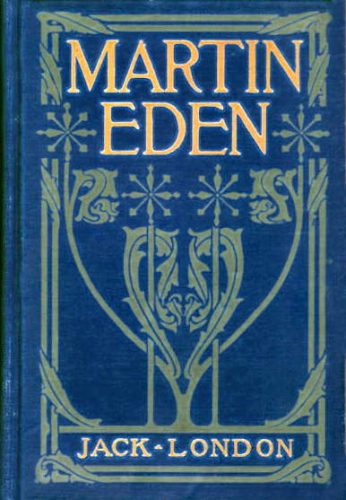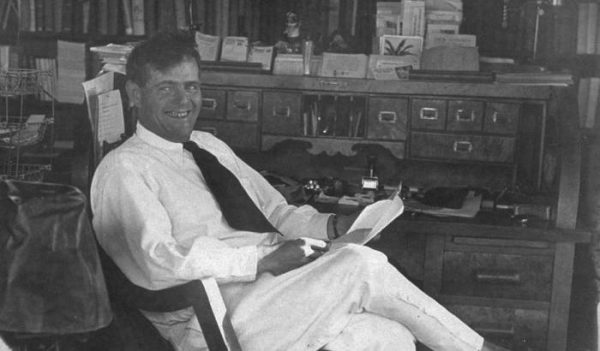Film Review: “Martin Eden” — Portrait of an Artist as a Young Egotist
By Gerald Peary
In his mostly successful filmic adaptation of Martin Eden, Italian director Pietro Marcello transposes with ease London’s Oakland novel to the seaport of Naples.
Martin Eden, directed by Pietro Marcello. At the Coolidge Corner Screening Room

Luca Marinelli and Jessica Cressy in a scene from Martin Eden. Photo: (Shellac/TNS)
Martin Eden, Jack London’s wordy and overwritten but still engrossing 1909 novel, is the story of a handsome, virile sailor whose unexamined interior life changes completely after he rescues a rich young man from being beaten up on the streets of Oakland, California. Martin is taken to the young man’s home, and for the first time he comes into contact with beautiful surroundings, fine dining, and, most important, books on the shelves. He vows to change his ways completely, especially when he falls madly in love with the young woman of the house, Ruth Morse. At her instigation, he learns correct grammar and manners. But Martin soon goes far beyond Ruth’s conventional wishes for him to get a well-paying job. He dedicates every minute of his day and night to reading and self-education, and then declares himself a professional writer, specializing in fiction and philosophic essays.
The most powerful, still potent sections of the book are Martin’s herculean struggles to succeed in a literary world indifferent to his torrential outpouring of writings. As he practically starves, his squalid room fills with rejected manuscripts, both ambitious works and genre fiction, and even jokes for sale sent to newspapers. For anyone who has ever been a writer, there is much to connect with in Martin’s humiliating failures, his proper hatred of stuffy, mediocre, uncaring editors. But Martin Eden becomes trying with its draggy, too-similar chapters about the stunted romance of Martin and Ruth. I kept wanting Jack London to wake Martin from his acute blindness so he’d realize the obvious: he and his amour are the most mismatched of lovers. It’s not OK that she is so prissy and uptight, so unsupportive of his literary longings, and incapable of understanding anything cultural that is not soft, safe, and intractably bourgeois. In fact, Ruth is a bit of a pill.

But Martin is no complete winner either. London opts for a protagonist who, though he’s admirable in his willfulness and his Horatio Alger desire to succeed, transforms into an obnoxious egotist with an off-putting philosophy of life. As the novel progresses, Martin comes to look down on the working-class from which he sprung and also rejects the leisure class, which has, albeit uncomfortably, taken him in. He feels superior to virtually everyone because of the quickness of his mind, the vigor of his intellect. Only Ruth gets a pass. Martin’s inflated regard for himself is fortified by his passionate reading of Herbert Spencer’s “survival of the fittest” works of social Darwinism, and his all-out embrace of the Nietzchean superman. He prefigures Ayn Rand in his attacks on liberalism and government controls and his bragging about himself as one of a small number of uncompromised “individualists.”
Although Martin Eden is in many ways an autobiographical novel, Jack London in real life was a Socialist. But Martin Eden rails against Socialism as a slave mentality. Is it a fault of the novel that London doesn’t make clear where he, the author, stands? Many readers have erroneously considered Martin as London’s mouthpiece, the way The Fountainhead’s Howard Roark would voice Ayn Rand. Says Wikipedia: “In the copy of the novel which he inscribed for Upton Sinclair, London wrote, ‘One of my motifs, in this book, was an attack on individualism (in the person of the hero). I must have bungled it, for not a single reviewer has discovered it.’”
In his mostly successful filmic adaptation of Martin Eden, Italian director Pietro Marcello transposes with ease London’s Oakland novel to the seaport of Naples. Martin is played with robust conviction by an excellent Luca Martinelli, a blue-eyed young Kirk Douglas. The names of characters, though not Martin’s, become Italian ones: i.e., Ruth is now Elena Orsini. The story remains fairly much the same, though described as “freely adapted from Jack London’s novel” in the credits.
To win over a liberal-minded film audience, the temptation would be to make Martin a palatable, progressive working-class hero. However, the movie protagonist is still Herbert Spencer-crazy, still someone who speaks out in an impudent right-wing manner at a Socialist rally. Quite courageously, filmmaker Marcello retains Martin’s deluded Trumpian rantings. Still, for much of the film, Martinelli’s Martin is a nicer, warmer guy than who he is in London’s novel. And his love, Elena, is, if not exactly endearing, more bearable than London’s heroine, someone more naïve and sheltered than the shrill, repressed bitch of the book. Their love for each other is comprehensible. And their breakup is also more motivated than in London. The movie of Martin Eden is also commendable in its portraiture of two secondary characters: Maria (Carmen Pommella), the kindly, earthy farmer woman who takes in Martin as a boarder, and Russ Brissenden (Carlo Cecchi), a pasty-skinned, sunken-cheeked inebriate, who becomes Mephistopheles to Martin’s Faust, leading his pal into Naples’s subterranean world of artists and intellectuals.
There are moments in the film of Martin Eden that bring to mind Italian Neo-Realist classics, particularly the Visconti of Rocco and His Brothers (1960). But director Marcello goes his own way, punctuating his story with showy, sometimes show-off expressionist flourishes. Though they add flavor to the storytelling, the montages of Italian street life via 16mm found footage, or fake found footage, are sometimes pretentious and obtuse. Do they really tell us anything about the mind or emotions of Martin Eden? I’m more partial to Marcello’s wild decision to set the film in an elastic time zone, sliding somewhat arbitrarily from the era of Mussolini to an early ’60s of manual typewriters into a futurist war zone in which a boat of African immigrants has landed on the Italian shore. This constructed embattled world — overtly anachronistic — is kind of Brechtian, reminiscent of what Jean-Luc Godard managed brilliantly in Les Carabiniers (1963).

Jack London in his writing studio. Photo: Wiki Commons
Martin Eden, the film, falters a bit in its last quarter. There is a jolting, disorienting moment when Martin goes, in a jump cut through time, literally from rags to literary riches, from a one-room apartment to a decadent estate with toady advisors and a sultry-looking gal Friday. And an uneducated girlfriend perhaps now his wife. It’s definitely confusing. Is it possible that some key scenes were edited out? There is talk of whether Martin took a manuscript written by his friend Russ and claimed it for his own, yet that doesn’t make sense based on what has been on screen. Finally, there’s too much of a transition from the Martin of old to a svelte new version with dyed blonde hair who is spoiled rotten and mean to everyone around him, who acts up like a child at a public reading.
Here is where Jack London’s novel got it better, where I really felt Martin’s anguish about being surrounded by flatterers and glad-handers, who love him only because he’s become famous. They gloat over the exact same manuscripts that, months before, they wouldn’t even look at. Curiously, Martin’s plight made me feel more sympathy for Jack Kerouac, another blue-collar writer who became an instant celebrity after struggling as an unknown for so many years, and who was likewise depressed and paranoid when at last a celebrity. There’s little difference between the On the Road writer drinking himself to an early death and what sadness happens, in book and movie, to the young genius talent, Martin Eden.
Gerald Peary is a Professor Emeritus at Suffolk University, Boston, curator of the Boston University Cinematheque, and the general editor of the “Conversations with Filmmakers” series from the University Press of Mississippi. A critic for the late Boston Phoenix, he is the author of nine books on cinema, writer-director of the documentaries For the Love of Movies: the Story of American Film Criticism and Archie’s Betty, and a featured actor in the 2013 independent narrative Computer Chess. His new feature documentary, The Rabbi Goes West, co-directed by Amy Geller, is playing at film festivals around the world.
Tagged: Jack London, Luca Marinelli, Martin Eden, Pietro Di Rauso


Excellent points here. I am only a couple of chapters into Martin Eden and it is obvious that Ruth is a pill that the protagonist will need to overcome (or be defeated by) — she is a sapling variation on Kurtz’s wife in Heart of Darkness, blind to the barbarities of the society that nurture her “civilized” sensibility. The “beauty” of literature is there to keep the rose-colored blinders on. (Early on there is an amusing battle between them over the value of the once scandalous poetry of Swinburne. Eden is pro, Ruth is a shocked con.)
As for Eden as superman, it seems to me that London was trying (but failing) to produce a variation on Ibsen’s Enemy of the People — another story of a warrior for truth who becomes ferociously disdainful of the masses he is “fighting” for. Ibsen’s Stockmann overcomes his despair at being defeated by the powers-that-be by becoming an educator — Eden is not as resilient.
London was torn apart by his anarchistic version of Darwinism. On the one hand, he wrote movingly of his solidarity with the underclass: “What is not good enough for you is not good enough for other men, and there’s no more to be said.” (From 1903’s The People of the Abyss, London’s still powerful study of the inhumane conditions in London’s East End slums.) In 1905’s “Revolution” he concludes that “the capitalist class has been indicted. It has failed in its management and its management is to be taken away from it. Seven million men of the working-class say that they are going to get the rest of the working-class to join with them and take the management away. The revolution is here, now. Stop it who can.” Feel The Bern!
Yet London was also deeply distrustful of collectivity; he saw existence, at its elemental level, as a dog-eat-dog free-for-all: “With rare exceptions, all the people in the world are scabs.” (From his 1904 essay “The Scab.”)
All of these texts are in a Library of America volume dedicated to London. It includes The Road, his anticipation, via hoboes on the run, of Kerouac’s hymn to male bonding, though without the latter’s misogyny. It also contains London’s enthusiastic review of Upton Sinclair’s The Jungle.